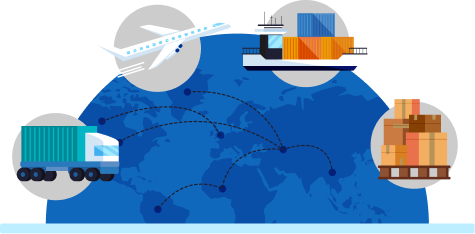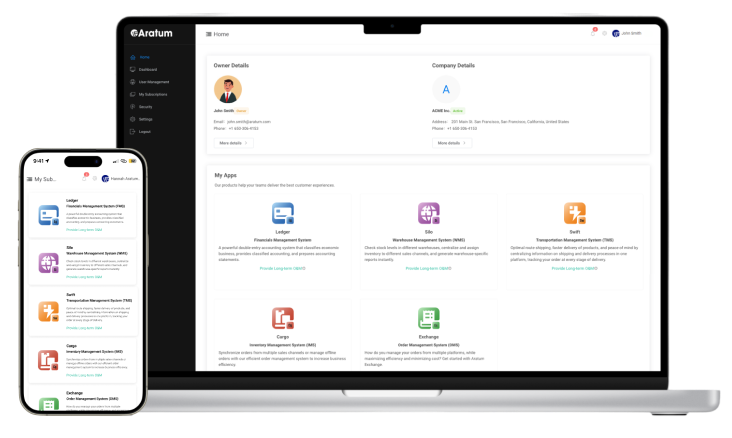While profit is not every business’s fundamental ethos, it cannot survive without it. Profit necessitates good financial management, especially in the swift trajectory of supply chains.
Aratum’s cloud-based and AI financial management system is the answer to an efficient, agile, resilient, and cost-effective business ready to take on every customer and market demand.
Cost Analysis and Control
Budgeting and Forecasting
Supplier Financial Health Monitoring
Payment and Invoicing Automation
Inventory Cost Management
Financial Risk Management
Multi-Modal Support
Compliance and Regulatory Reporting
Performance Metrics and KPIs
Collaboration and Communication
Integration with ERP and SCM Systems
A financial management system provides tools and analytics for analyzing costs associated with different aspects of the supply chain, such as procurement, transportation, warehousing, and inventory management. These tools enable users to identify cost-saving opportunities and implement cost-control measures.

A financial management system offers functionalities for creating and managing budgets for various activities within the supply chain. Include forecasting tools that help predict future financial performance based on historical data and market trends.

Users can assess suppliers' financial stability and performance through financial metrics, credit ratings, and other relevant indicators. This helps in mitigating risks associated with supplier bankruptcies or financial instability.

A financial management system automates repetitive tasks such as invoice generation, approval workflows, and payment processing and can streamline the invoicing and payment process. Integration with accounting systems can further enhance efficiency and accuracy.

A financial management system provides tools for tracking and managing inventory costs, including carrying, holding, and obsolescence costs. Implement strategies for optimizing inventory levels to minimize costs while maintaining service levels.

A financial management system offers features for identifying and mitigating financial risks within the supply chain, such as currency fluctuations, interest rate risks, and commodity price volatility. Provide hedging mechanisms and risk mitigation strategies to protect against adverse financial impacts.

In today's global supply chains, shipments often involve multiple modes of transportation (e.g., truck, rail, ocean, air). A robust TMS supports various transportation modes and facilitates seamless coordination between them.

A financial management system provides tools for generating financial reports, tax filings, and other regulatory disclosures to ensure compliance with financial regulations and reporting requirements. It also informs users about changes in relevant regulations and helps them stay compliant.

A financial management system enables tracking of key performance indicators (KPIs) related to financial management in the supply chain, such as cost per unit, inventory turnover, days payable outstanding (DPO), and cash conversion cycle. Performance metrics can be visualized through dashboards and reports for easy monitoring and analysis.

Facilitate collaboration and communication among stakeholders involved in financial management within the supply chain, such as finance teams, procurement professionals, suppliers, and logistics partners. Provide a centralized platform for sharing information, documents, and updates in real-time.

Ensure seamless integration with enterprise resource planning (ERP) systems and supply chain management (SCM) platforms to enable data sharing and synchronization across different functional areas. This integration enhances visibility, efficiency, and accuracy in financial management processes.

Financial management ensures optimal resource allocation, cost-effective procurement of medical supplies and pharmaceuticals, and adherence to regulatory standards, thus ensuring patient care delivery while maintaining fiscal sustainability.
Financial management involves budgeting for inventory procurement, optimizing pricing strategies, and managing cash flow to ensure efficient operations, timely product delivery, and profitability, enhance customer satisfaction, and drive business growth.
Financial management encompasses rigorous budgeting for research and development, efficient procurement of raw materials and packaging, and compliance with stringent regulatory requirements aimed at innovation, superb product quality, and sustainable growth.
Financial management optimizes payment processing, securely manages transactional data, monitors revenue streams to ensure profitability, drives trust with customers and suppliers, and supports scalable growth in the digital marketplace.
Financial management optimizes freight costs, manages fuel expenses, and invests in fleet maintenance to ensure timely and cost-effective delivery of goods, enhancing customer satisfaction and profitability while maintaining operational efficiency.
Financial management focuses on investments in temperature-controlled storage, transportation infrastructure, and monitoring technologies to ensure product integrity, minimize spoilage, comply with regulatory standards, safeguard public health, and maintain operational efficiency.
Effective financial management optimizes capital allocation and liquidity and mitigates financial risks. It also facilitates smooth transactions and fosters stakeholder trust, ultimately contributing to overall business resilience and long-term success.
Financial management appropriately allocates budget for procurement, transparent expenditure tracking, and compliance with fiscal regulations to ensure accountability, efficient service delivery, and responsible use of taxpayer funds, improving public trust and supporting effective governance.
Financial management drives efficient resource allocation for raw materials procurement, production processes, and equipment maintenance. It also optimizes operational costs and inventory levels to meet demand while maximizing profitability and ensuring product quality and regulatory compliance.
Financial management allocates resources for robust data protection measures, invests in advanced threat detection technologies, and implements risk mitigation strategies to safeguard sensitive information, protect against cyber threats, and maintain stakeholder trust.
Financial management enhances specialized storage, safety protocols, and regulatory compliance to mitigate risks with hazardous materials, safeguard employees, protect the environment, and reduce liabilities.
Financial management optimizes infrastructure investments, controls operational costs, and promotes sustainable resource management to ensure reliable service delivery, mitigate environmental impact, and support long-term economic viability.

A multinational FMCG company in Greece known for its diverse portfolio of food and beverage products faced operational challenges due to fluctuating raw material costs, inefficient inventory management, and escalating distribution expenses that impacted its profitability. It hindered its ability to meet consumer demand effectively.
Because of these challenges, the FMCS company sought our financial management system to streamline its operations.
In response to these challenges, the courier service company sought our solutions to optimize its operations.
Financial management in supply chains involves the strategic planning, monitoring, and controlling of financial resources and activities across the entire supply chain, from procurement to distribution, to optimize costs, mitigate risks, and enhance financial performance.
Financial management is crucial in supply chains as it helps organizations make informed decisions about resource allocation, budgeting, and investment, ensuring efficient operations, cost-effective procurement, and sustainable growth while minimizing financial risks.
Effective financial management positively impacts supply chain performance by optimizing resource utilization, reducing costs, enhancing cash flow management, improving inventory turnover, mitigating financial risks, and ensuring compliance with regulatory requirements.
Common challenges include volatile raw material costs, inefficient inventory management, fluctuating exchange rates, supply chain disruptions, regulatory compliance issues, cash flow constraints, and lack of visibility into financial data across the supply chain.
Organizations can improve financial management by implementing robust budgeting and forecasting processes, leveraging technology for data analytics and automation, enhancing collaboration with suppliers and partners, adopting best practices for risk management, and investing in employee training and development.
Technology plays a crucial role in financial management by providing tools and platforms for real-time data analysis, automated invoicing and payment processing, inventory tracking, financial reporting, predictive analytics, and integration with other business systems such as ERP and SCM.
Financial management contributes to sustainability in supply chains by promoting responsible resource use, reducing waste, minimizing carbon footprint, ensuring ethical sourcing practices, and supporting initiatives for environmental conservation and social responsibility.
Integration of financial management with other supply chain functions such as procurement, logistics, and operations enables seamless data sharing, improved visibility, better decision-making, enhanced collaboration, and greater efficiency across the entire supply chain ecosystem.
Organizations can measure effectiveness through key performance indicators (KPIs) such as cost-to-serve, cash-to-cash cycle time, inventory turnover, working capital ratio, return on investment (ROI), and compliance with financial benchmarks and targets. Regular performance reviews and audits can also provide insights into areas for improvement.
Organizations can mitigate financial risks in their supply chains by diversifying their supplier base, conducting thorough financial health assessments, establishing contingency plans, hedging against currency fluctuations, implementing robust contract management processes, and investing in insurance policies to cover potential losses.

To implement a financial management system in your supply chain, you can rely on Aratum solutions tailored to your business requirements to help you get started and gain visibility, efficiency, and resiliency.
Aratum is a globally recognized software provider specializing in developing supply chain management solutions. Our software solutions incorporate advanced algorithms and optimized data structures to facilitate efficient data processing and information dissemination across organizations.
Leveraging cutting-edge technologies such as machine learning and artificial intelligence, the software enables automated decision-making and real-time analytics, enhancing supply chain visibility and improving overall performance.
With a focus on delivering robust and scalable solutions, Aratum is committed to providing our clients with the tools necessary to optimize their supply chain operations and gain a competitive edge in your respective markets.






© 2024 Aratum or an Aratum affiliate company. All rights reserved. No part of this publication may be reproduced or transmitted in any form or for any purpose without the express permission of Aratum or an Aratum affiliate company. The information contained herein may be changed without prior notice. Some software products marketed by Aratum and its distributors contain proprietary software components of other software vendors. National product specifications may vary. These materials are provided by Aratum or an Aratum affiliate company for informational purposes only, without representation or warranty of any kind, and Aratum or its affiliated companies shall not be liable for errors or omissions with respect to the materials. The only warranties for Aratum or Aratum affiliate company products and services are those that are set forth in the express warranty statements accompanying such products and services, if any. Nothing herein should be construed as constituting an additional warranty. In particular, Aratum or its affiliated companies have no obligation to pursue any course of business outlined in this document or any related presentation, or to develop or release any functionality mentioned therein. This document, or any related presentation, and Aratum’s or its affiliated companies’ strategy and possible future developments, products, and/or platforms, directions, and functionality are all subject to change and may be changed by Aratum or its affiliated companies at any time for any reason without notice. The information in this document is not a commitment, promise, or legal obligation to deliver any material, code, or functionality. All forward-looking statements are subject to various risks and uncertainties that could cause actual results to differ materially from expectations. Readers are cautioned not to place undue reliance on these forward-looking statements, and they should not be relied upon in making purchasing decisions. Aratum and other Aratum products and services mentioned herein as well as their respective logos are trademarks or registered trademarks of Aratum (or an Aratum affiliate company) globally. All other product and service names mentioned are the trademarks of their respective companies. See aratum.com for additional trademark information and notices.